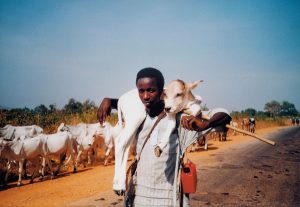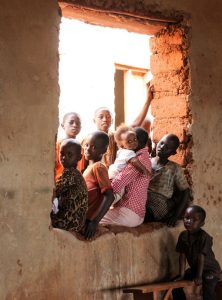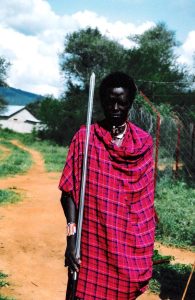by Sr. Chris Gill MMM Ireland 28.06.2024
 It was late evening when Mohammed Ibrahim arrived at the clinic in Fuka, northern Nigeria. He looked tired and weary after the long journey and had a bad cough for a long duration. Hannatu, our evening nurse, welcomed him and gave him an appointment for laboratory tests. She admitted him into the Tuberculosis Unit and from the nearby “take-away” got him some food. He was glad to have a bed and he enjoyed the company of other patients in the Unit, some of whom were Fulanis, his own ethnic group.
It was late evening when Mohammed Ibrahim arrived at the clinic in Fuka, northern Nigeria. He looked tired and weary after the long journey and had a bad cough for a long duration. Hannatu, our evening nurse, welcomed him and gave him an appointment for laboratory tests. She admitted him into the Tuberculosis Unit and from the nearby “take-away” got him some food. He was glad to have a bed and he enjoyed the company of other patients in the Unit, some of whom were Fulanis, his own ethnic group.
While taking his clinical history, I was amazed to discover that he was from Sokoto State, close to the Niger Republic border. I asked Mohammed how he had heard of our little clinic. He said: “I heard the news in Mecca.” He told me that when he was on pilgrimage in Mecca, performing the Hajj, his cough became very distressing. A Good Samaritan came to his aid with water and a seat to sit on. In the course of conversation, Mohammed told him how he had had the cough for years, has been to clinics and hospitals, but to no avail. The cough remained and grew worse.
His new-found friend told him that he too had had a cough like his but had been cured in Fuka. Mohammed immediately asked him if Fuka was in Nigeria; his friend nodded and gave him directions to the clinic.
As expected, Mohammed tested positive for pulmonary tuberculosis. He was emaciated and anaemic from many years of coughing blood. He was placed on an intensive course of anti-tuberculosis treatment for two months. These drugs are supplied free by the Niger State, in collaboration with the World Health Organisation.
Mohammed’s health began to improve after his other ailments, such as malaria and typhoid, were treated. When he was admitted he weighed just 45 kilos, and he was a very tall man! He stayed with us for two months and has made remarkable progress. Since that time his entire family has come for tests and been given appropriate treatment.
Other people from his area have also come for treatment, so Mohammed is one of our “Goodwill Ambassadors”!
 It was a cold morning. A small crowd was gathering outside our doctor’s emergency surgery but none of us knew what time the clinic would open as the website stated: .. “there will be changes on bank holidays.” However, there was no update informing us of the changed clinic times for today a bank holiday Monday.
It was a cold morning. A small crowd was gathering outside our doctor’s emergency surgery but none of us knew what time the clinic would open as the website stated: .. “there will be changes on bank holidays.” However, there was no update informing us of the changed clinic times for today a bank holiday Monday.by Sr. Sheila Campbell MMM Ireland 24.06.2024
 Many years ago, while I was a student in England, one of our Sisters got in touch with me. She was also based in England, but her job at that time was going around the various parishes and schools, talking about the missions and our medical missionary work. Sr. Eithne was a lovely friendly person, so how could I say ‘no’. Off I went the next weekend to the town where she was staying and early on the Sunday morning, we were to set off for the early morning Mass at a church which was a good distance away. “Be sure to be ready, “she warned me, “we have to make an early start.”
Many years ago, while I was a student in England, one of our Sisters got in touch with me. She was also based in England, but her job at that time was going around the various parishes and schools, talking about the missions and our medical missionary work. Sr. Eithne was a lovely friendly person, so how could I say ‘no’. Off I went the next weekend to the town where she was staying and early on the Sunday morning, we were to set off for the early morning Mass at a church which was a good distance away. “Be sure to be ready, “she warned me, “we have to make an early start.”
Whether it was the early start, or maybe she was just always like this, I do not know, but I found her very “scattered” the next morning. She was trying to dress, stuff leaflets into a bag, drink tea, and write down instructions for the journey all at the same time. She was a good driver, but flustered getting into the car, checking all kinds of things before we set off.
Eventually we arrived at the church – and then we discovered the lost shoes! At least we didn’t find them, that was the point. In her scatteredness she had placed her shoes on the roof of the car, meaning to carry them to the church and put them on before she left the car. The shoes must be a good distance back along the motorway by now.
Undaunted, in her full grey habit and red slippers she stood up in the church to give her talk. I would say we got a good collection that day, to help the poor Sister buy some shoes!
Another Sister, I will call Maeve, told me about the time a similar incident had happened to her. She was getting into the car, but distracted as she was watching a wedding party taking photos near a grotto in the convent grounds. She set off out the gate and down the hill towards the town. The street traders were all waving at her frantically and she was greeting them back, amazed that they were so friendly when they should be trading. Finally, one trader almost risked her life to step in front of the car to stop it. Maeve found that one of the wedding guests had left a cup of coffee and its saucer, on the bonnet of the car. She had driven down the hill and not a drop had spilt!
Now that I am getting old and forgetful, it is good to remind myself that memory lapses can happen at all phases of life!
by Sr. Joanne Kelly MMM Ireland 22.06.2024
 These lovely summer mornings I like to take my breakfast tea to the big window to look out to our lovely garden, with its lush foliage, variety of beautiful trees, and wild patches where there are blooms from all kinds of flowers and grasses. Right opposite are stately pine trees. I watched a woodpigeon. I first saw her as she alighted on a lamppost opposite the window. From there she swooped down into the garden and went round picking, picking, and picking. What she was finding to pick I don’t know!
These lovely summer mornings I like to take my breakfast tea to the big window to look out to our lovely garden, with its lush foliage, variety of beautiful trees, and wild patches where there are blooms from all kinds of flowers and grasses. Right opposite are stately pine trees. I watched a woodpigeon. I first saw her as she alighted on a lamppost opposite the window. From there she swooped down into the garden and went round picking, picking, and picking. What she was finding to pick I don’t know!
Then she flew back up to a particular place in the pine tree, landed on a flimsy branch and walked into the tree. In seconds she was out onto the lamppost and started the whole process again. Watching for some time I realised she must be feeding her young chicks. I wonder what size of family she had but there was certainly no quick way to feed them- no fast food there! I am somehow reminded of summer days at home when I was a child when we could roam around the country, finding birds’ nests, watching them carefully without disturbing them, and later being in the fields especially at haymaking time.
The weather was always unpredictable. At the time of saving the hay any fine day was precious. My father and the boys would stay in the field all day, literally “making hay while the sun shone” It was the job of my sister and I to help our mother keep them well fed. It was the time of World War 11, and everything was scarce, nothing much available. We had what we could grow and were blessed with that. So, about every two hours we brought food to the field. We made sandwiches, buttered lots of homemade soda bread (brought some jam too) and a big tight – lidded can of hot tea with milk and sugar already in it.
When the menfolk saw us coming, they moved to the shade of the nearest tree and sat down ready for their break. We always got a great welcome and there were lots of stories and fun as they enjoyed their big mugs of tea. As soon as the “workers” got what they wanted we had our own share and it tasted so special out there in the fresh air with the smell of the hay, butterflies flitting around and often a bee or a wasp buzzing about attracted by the jam.
There were no holidays abroad then or fast food either, but we enjoyed our summers. Our nearest phone was in the post office two miles away and only used for emergencies.
In recent years technology has made wonderful advances in everything in the world but I think some beautiful wholesome things are in danger of being lost on the way.
I am reminded of the Gospel when Jesus, surrounded by crowds, had been casting out demons, healing and preaching about love and forgiveness and they thought he was out of His mind. One commentator noted that it was world which was out of its mind and Jesus the only one who could bring the message of true love and healing.
Today it would seem the world is still out of its mind, running into destruction, and Jesus is still the only one who can save us. We know He has promised that evil can never overcome. But the task to prevent it is enormous and we can feel helpless.
I am reminded of advice our Foundress Mother Mary Martin was given in the early days when she felt the task was beyond her.
“Never fear when you feel weak before the task. We know well enough that it is God, not ourselves, who will do the work. Keep full confidence in God, do what you can and be as good an instrument as you can be in God’s holy hands “
So, like that little woodpigeon mother, we can continue searching and caring, spreading precious titbits of love, kindness and acceptance wherever we are, with all whom we meet and for as long as we can.
by Sr. Sheila Campbell MMM Ireland 20.06.2024
 The other day I was handed a large box of documents to shred. It is a boring, monotonous task but I did learn a lot about myself and life’s journey!
The other day I was handed a large box of documents to shred. It is a boring, monotonous task but I did learn a lot about myself and life’s journey!
The first task was to discover that the documents were all stored in files. Each file was neatly labelled. Just like my life, I thought. In my mind don’t have my own life stored up in my memory in separate files? There is my early childhood, school years, staring MMM and studies, then Brazil Part One, the six years in Dublin and then Brazil Part Two. Each part of my life is encompassed, or bound, by life events or geographical moves. Now I am being called to open up the boxes and see what is inside.
Next, I had to remove each document from its plastic cover. Umm, I thought, how often in life do I hide myself away “under plastic” to preserve the status quo. Protection may be necessary for a time, but just as I am now shredding these documents, at some stage all covers are off and we present ourselves naked before God.
Then comes the difficult bit. In order not to destroy the shredder, it is important that only paper is put through the machine. So, all staples and paper clips need to be removed. I discovered that somebody in the past was trigger-happy with the stapling gun! Instead of one staple neatly at the corner, the staples could be all over the place. What are the staples in my life, I mused?
No ready answer for this one. It could be the unhealthy relationships that I insist on maintaining, like right now with chocolate when I am pre-diabetic. Or staples could be the temporary crutches I use to get through difficult situations. Either way, to be myself, I need to let go of the ‘temporary fixes”.
As I guide the sheets of paper into the shredder, I think of how God will ‘recycle’ me when my time on earth is done. Yes, my body will go into the earth, but the true ‘me’, who I really am, will be recycled in the loving embrace of God’s love.
Now, thank you God, for giving me a boring task if it brings me to a greater awareness of myself and your presence in my life.
by Jo Doyle Ireland 18.06.2024
 Grief. Shock. Numbing silence.
Grief. Shock. Numbing silence.
Followed by an activity of noise, blaming, accusation, fighting.
Then the shattering.
Shattering of loss, not only from the one who died, but the loss of many you thought would be there.
Grief is a deconstruction.
Brick by brick, a deconstruction.
A finding of who you are.
I search for silence.
My search for a place of meaning.
How does this loss and all the losses fit into my jigsaw life.
I have a hole in my soul which is full of pain, bewilderment, despair too. Such sadness and emptiness.
A cavernous tunnel of grief waiting to welcome me into its underground lace work of mysterious suffering.
This embroidery of pain tunnels its way to the core of my life.
There is no safety in the darkness of my earth.
Then, a certain collapse occurs.
My foundation implodes.
I go with it, and nobody notices.
Alone and silent.
I love the silence, like breathing underwater.
No more accusations.
The outer noise fades away.
I am so distant now.
This inner darkness is my nectar from the heavens.
A Oneing with the infinite universe.
At least I am connected to something, even if it’s darkness.
Stillness is taking me deeper.
Where has the pain gone?
Oh, I have a cemetery of memories in my soul.
Burning, crushing memories of loss, too young.
And mourning with no hope of repair.
Oh, how this villainous grief waits, to show that you are now alone, swallowed in darkness.
The rock of ages holds nothing to the rock of my heart.
Dried out now, unable to receive, unable to absorb the nurturing waters of life.
A puddle of unabsorbed peace lies like dreaded poison.
So, the journey to life begins once more.
Jo Wardhaugh Doyle is farming in Kildare with her husband Matt. She has worked in Uganda, Ethiopia and Kenya, but more recently has worked with Sr Rita Kelly MMM doing the REAP programme in the Irish Missionary Union (IMU).
by Nadia Ramoutar MMM Communications Coordinator Ireland 16.06.2024
 Every now and then, as I am doing my work in Communications for the MMMs, I read something related to our work in Global Health and Justice and I feel so angry I have to stop and pause. Today is one of those days and here is why.
Every now and then, as I am doing my work in Communications for the MMMs, I read something related to our work in Global Health and Justice and I feel so angry I have to stop and pause. Today is one of those days and here is why.
UNICEF just introduced the term “severe child food poverty” to reference a child’s inability to access and consume a nutritious and diverse diet in the first five years of their life. This as you most likely know, very harmful to young children as it can do great harm to their ability to grow or even to survive. The consequences can last a lifetime if the child is able to live.
The label refers to children having access to two or fewer food groups, meaning they are rarely eating any nutrient-dense food. Starving children live all over the world, but South Asia and Sub-Saharan Africa have more than their fair share – as in two thirds. While statistics are unreliable at best, the estimate of 181 million children struggling with severe child food poverty is far too many for me. I am disturbed at the amount of food waste in many parts of the world in contrast to this.
So at the same time we have the challenges of obese children in parts of the world and severely starving children in other parts. This must be an adult problem. We adults really do have to step up in some way to see this unacceptable at best, imbalance righted.
What will it take for us grown humans to bring some greater justice to food issues in our world? How can we somehow prevent this divide in wealth from becoming more extreme instead of less? I am saddened for the child who is going hungry right this minute or not getting the nutrients needed to be well. But, imagine being the mother watching your child basically starving. We know this, where there is a severely poor and hungry child, they are in the care of a mother without options.
MMM projects that try hard to counter act climate crisis are essential. We need to find ways to help poor mothers grow food wherever possible and to also work or generate some kind of income. We know that climate crisis will continue to make access to more food even harder for the people who didn’t cause the increase in the climate crisis to begin with.
I hope after reading this you too feel the sense of foreboding with this new term and the sense of anger and frustration motives us all to keep working for a better tomorrow for the most needy. No child deserves to starve. End of story.
Here is the link to the full report.
https://data.unicef.org/resources/child-food-poverty-report-2024/?utm_id=Child%20Food%20Poverty%20Report%202024
by Sr. Eilis Weber MMM Ireland 14.06.2024
Sr. Eilis remembers her time in Angola. MMM staffed Chiulo Hospital in the south of Angola from 1953 up to 2002. This was during the years of the struggle for independence, war and civil unrest.
 The war was at its height. The South African Army had invaded Angola across the southern border, looking for Swapo guerrillas. One day we were returning to Chiulo Hospital with much needed supplies and food, from the city of Lubango 300 km to the north. Along the road, we were told South African troops were ahead. We tacked a white flag to a stick and held it out the window hoping it would show that we were people of peace. It was very difficult to hold this against the high wind. We were about twenty kilometres from our hospital, when we heard the shots. The Landover shuddered and went out of control. The tyres had been hit. We knew we were being ambushed.
The war was at its height. The South African Army had invaded Angola across the southern border, looking for Swapo guerrillas. One day we were returning to Chiulo Hospital with much needed supplies and food, from the city of Lubango 300 km to the north. Along the road, we were told South African troops were ahead. We tacked a white flag to a stick and held it out the window hoping it would show that we were people of peace. It was very difficult to hold this against the high wind. We were about twenty kilometres from our hospital, when we heard the shots. The Landover shuddered and went out of control. The tyres had been hit. We knew we were being ambushed.
Luckily our driver, Parafuso, succeeded in bringing the vehicle to a stop in the ditch, without injury to any of us. When the soldiers saw that we were two expatriate women with the Red Cross of an Ambulance painted on the sides and roof, they were shocked at what they had done. Our vehicle was totally destroyed. They brought us into the bush, and after some communication by radio with HQ, told us a chopper would be coming to collect us. Half an hour later we heard the sound of the helicopter approaching. As soon as it landed they swept us into it and we were airborne within 60 seconds. They were terrified of Swapo sniper fire.
At the army HQ they made us tea in a billycan, and two hours later flew us home. We had none of the supplies we had risked our lives to get, but we were never so happy to see Chiulo!
by Sr. Ruth Percival MMM England/Tanzania 12.06 2024
 “I will leave my spear here, it will protect you,” said the warrior as he thrust his spear into the ground a few feet away from the Land Rover. Smiling, he hurried after the other warriors who had disappeared over the edge of the ridge. looked around. I was alone in a large clearing, a few hundred feet up the mountain that stands behind our house. The ridge – so impressive and distant from below – was clear and close in every detail. All I could see were hills and more rolling hills in the distance. The valley lay below, hidden by trees. I marvelled at the beauty of the scene, at the scented blossoms on the grey thorn trees. At the same time, a sense of self-preservation dictated that I should fix the rear-view mirror on the undergrowth behind me, to watch for animal movements.
“I will leave my spear here, it will protect you,” said the warrior as he thrust his spear into the ground a few feet away from the Land Rover. Smiling, he hurried after the other warriors who had disappeared over the edge of the ridge. looked around. I was alone in a large clearing, a few hundred feet up the mountain that stands behind our house. The ridge – so impressive and distant from below – was clear and close in every detail. All I could see were hills and more rolling hills in the distance. The valley lay below, hidden by trees. I marvelled at the beauty of the scene, at the scented blossoms on the grey thorn trees. At the same time, a sense of self-preservation dictated that I should fix the rear-view mirror on the undergrowth behind me, to watch for animal movements.
What were we doing up the mountain? A cow had broken a leg in a ravine and had to be slaughtered. We were asked for the Land Rover to bring the meat down for sale. The poor cow was about a mile from where I was left with the spear protecting me from the lions. When the warriors eventually returned, they brought me a third of the cow’s heart, beautifully cooked. That was considered a very big honour, and delicious too! It was a great honour for us to have been invited to live in Maasai country in Tanzania. Within a 15 km radius there were over 50 bomas, with approximately 60 family members in each.
The boma is a circular compound where the Maasai live. Inside the circle made of thorn bush that protects the people and the cattle inside can be found a few houses where people sleep. As these are a semi-nomadic people, they travel often with their animals, and sometimes with their whole family, in search of pasture. There are innumerable little sandy tracks and paths criss-crossing all over. They all look alike, so it is easy to get lost. But this is not advisable, as lions, buffalo and elephants are among the many animals who inhabit the locality. Half a mile from our boma there was a great open watering place for the thousands of cattle, sheep and goats. There is a domestic water point here too. The water flows down the mountainside from a spring. The open place is the centre for everyone’s life. There the people meet; the elders gather for their meetings. The warriors gather with their cattle and goats. The women and children come here to fetch water for the home.
This was my home for many years.
by Sr. Sheila Devane MMM Ireland 10.06.2024
 Frequently I end a letter, or an email, with the single word “Blessings.” When I do this I don’t see myself actually blessing anyone, in fact I hadn’t ever thought about how these blessings might be imparted until a day last week. Can I tell you about it?
Frequently I end a letter, or an email, with the single word “Blessings.” When I do this I don’t see myself actually blessing anyone, in fact I hadn’t ever thought about how these blessings might be imparted until a day last week. Can I tell you about it?
I was sitting at the laptop near a window working away on client notes and through the blinds saw a figure outside; believing it was someone calling to the door I went out to find it was a man dressed in a workman’s outfit complete with crash helmet and high vis jacket. He greeted me as ma’am and told me that he had been cleaning the gutters of many of my neighbours’ houses and saw mine from on high – they were in a sad and sorry state. He then said that this is work he could do.
Without too much reflection or thought and mainly on automatic pilot I found myself greeting him back, thanking him for coming and saying that we were a registered charity and needed to only engage workmen from companies that were formally registered. I have to confess that I had no idea at this stage if this man’s company were a state one, a highly registered one or whatever, but somehow I got into this rant making a quick decision that I had a nice man who could rip me off any minute. So, far so bad.
I smiled and thanked him and somewhere in this “speech” I must have said something or other about this being a convent. He became animated and was no longer interested in talking about gutters but about his little boy Tony (his namesake) who is aged 6, autistic, nonverbal and needing our prayers. I was no longer on automatic pilot but listening with empathy as he talked of their efforts to get schooling and help for this young child. He had never been to school himself. He wondered would his son ever talk. Would he ever be able to live independently? Would he get the help he needed and how would they get it? He told me of how they are now praying to Carlo Acutis and he was thrilled I knew of this future, youthful, saint saying how they looked at videos of Blessed Carlo the night before.
I was on holy ground, listening to a deeply faithful man, witnessing here on the doorstep to a level of trust in God and a degree of hope in divine providence that were profound and so moving. As he went to leave, he said: “Goodbye ma’am – no you are Sister.” Then he turned around, came back, and asked for my blessing. I was shocked. There is always a first time. Here I was gathering myself together and praying a blessing for this concerned and holy parent.
My one, and big, regret is that I did not ask Tony to bless me. Somehow, I know he did.
